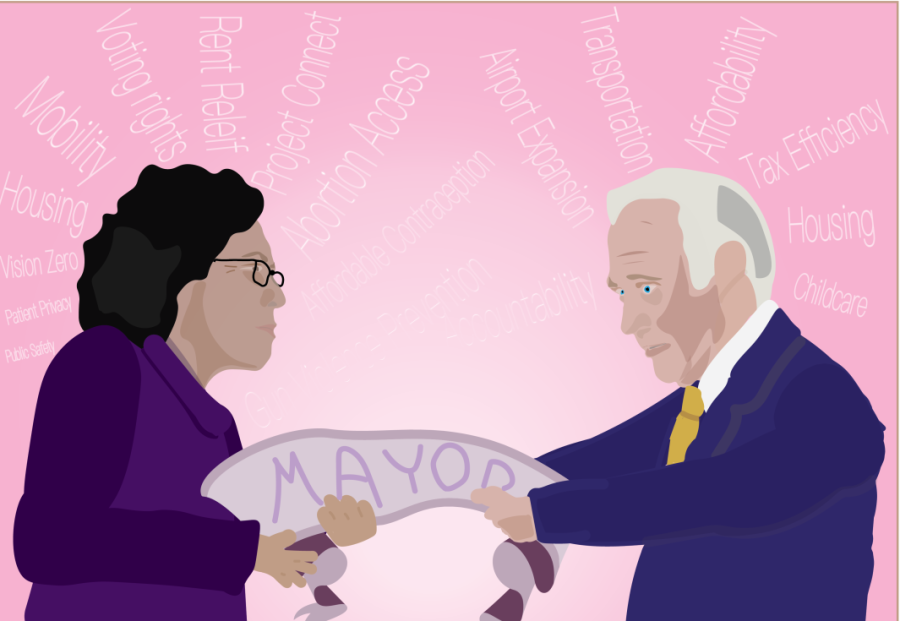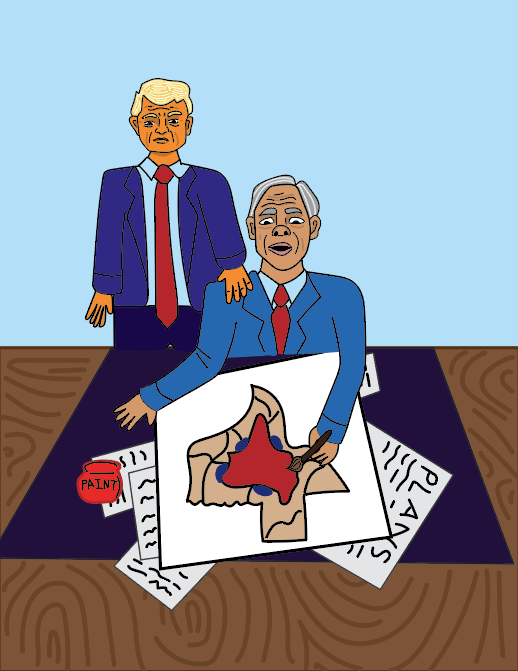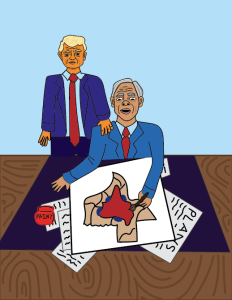Out with the old and in with the new
Austin’s runoff results have finally been announced and this could be the change we need
Clearly, both candidates have the experience and will to do the job of Austin mayor well. The main difference between these candidates presents itself through their identities.
December 29, 2022
You have an important choice. Given two people with similar objectives and performance but different backgrounds, you must decide which candidate you want to hire.
The first candidate actually worked for you several years ago and did a good job, but might not be the right person for the job two decades later. The second candidate doesn’t have experience in the exact position you are looking to fill, but has proven to be reliable and could bring new and improved ideas to the table.
So, who do you choose? In this case, the job we are looking to fill is the Mayor of Austin, and their actions will affect all of us in some way. Celia Israel has time and time again show to be fit for a role such as Mayor. Compared to former Austin Mayor, Kirk Watson, Israel will bring so much more to the table.
Both candidates, Watson and Israel have similar focuses of their respective campaigns: housing and affordability in Austin. However, both have strikingly different backgrounds and experience. Watson largely represents the status quo; Israel as an openly gay Latina would bring added diversity to our city council.
Watson has a long history of public service. Watson attended Baylor Law school where he graduated first in his class and was also Editor-in-Chief of the Baylor Law Review. In 1991, Governor Ann Richards appointed Watson to serve as chairman of the Texas Air Control Board. He was also the Mayor of Austin from 1997 to 2001 and later served as a member of the Texas Senate from 2007 to 2020.
However, Israel has also spent many years in politics. She graduated from UT Austin with a degree in Government. After graduation, she served in Governor Ann Richards’ administration. She was elected in 2014 to represent the 50th district in the Texas House of Representatives and served four terms. While serving in the Texas House, she was a founding member of the Texas House LGBTQ Caucus, and “Freshman of the Year” in her first term.
What have we learned about these candidates during their time in public office?
Watson served as Austin Mayor over 20 years ago, arguably when Austin was a much different city. There are visible signs in Austin of Watson’s tenure during that time. Watson has been credited with the “Smart Growth Initiative” in Austin that advocated for a walk-able, bicycle friendly downtown, with mixed-use development.
He has also been credited with turning downtown Austin into a “24-hour downtown,” turning unused warehouses and parking lots into mixed-use housing and retail developments, largely through the use of tax incentives. His popularity at the time is evident in his re-election results, 84% of the vote, the highest ever received by an Austin candidate for mayor.
During his time in the Texas Senate, Watson advocated for clean energy, higher education, and health care coverage. In 2009, he successfully fought against a budget rider that would have banned stem cell research at Texas universities. In 2013, abortion rights were threatened by SB5, which Wendy Davis famously filibustered. Watson assisted her by moving to overturn a ruling that would have ended Davis’ filibuster. It’s no surprise that Davis has endorsed Watson’s 2022 mayoral run.
Israel has also spent several years in politics at the Texas House of Representatives. However, her tenure there has received far less coverage than that of Watson’s years in politics.
As a Democrat in the House, her party was in the minority. Her own legislative priorities and even committee assignments would have been dictated by the Republican leadership. She did however rise to a leadership position within the Democratic Caucus, serving as Vice Chair of the Texas House Democratic Caucus and led the Steering and Policy Committee.
Israel has been a proponent of voting rights, introducing a bill that would allow for online voter registration with electronic signature. In 2021, she was part of a group of Democrats in the house who decided to break quorum and leave the state in an effort to prevent the passage of a restrictive voting rights law.
On the transportation front, Israel was the author of HB 594 which required the Department of Transportation and Texas Transportation division to develop a discount program for truckers to incentivize their use of SH-130, and avoid the crowded I-35.
What are the candidates’ priories for mayor? Housing is clearly a large part of both candidates’ platforms. In addition, both candidates are looking to solve the pressing issues of affordability, as well as transportation in a metropolitan area which has grown by nearly a million people since the year 2000 when Watson was previously in office.
Clearly, both candidates have the experience and will to do the job of Austin mayor well. The main difference between these candidates presents itself through their identities. We have Watson, the status quo, who has already had the job, or Israel, a well-rounded leader who could bring diversity and new ideas to the table. Because of this difference, the best candidate for Austin Mayor is undoubtedly Israel.









